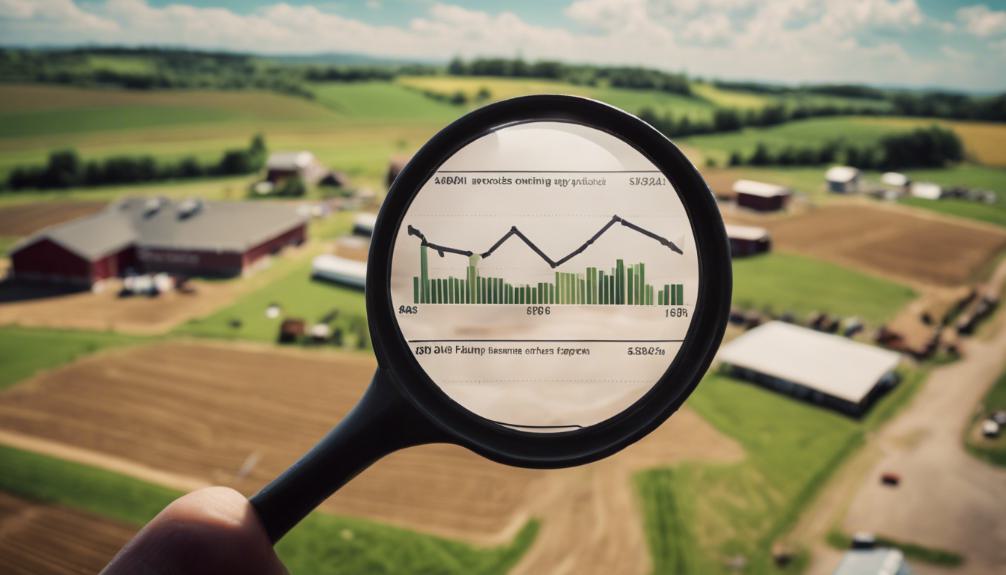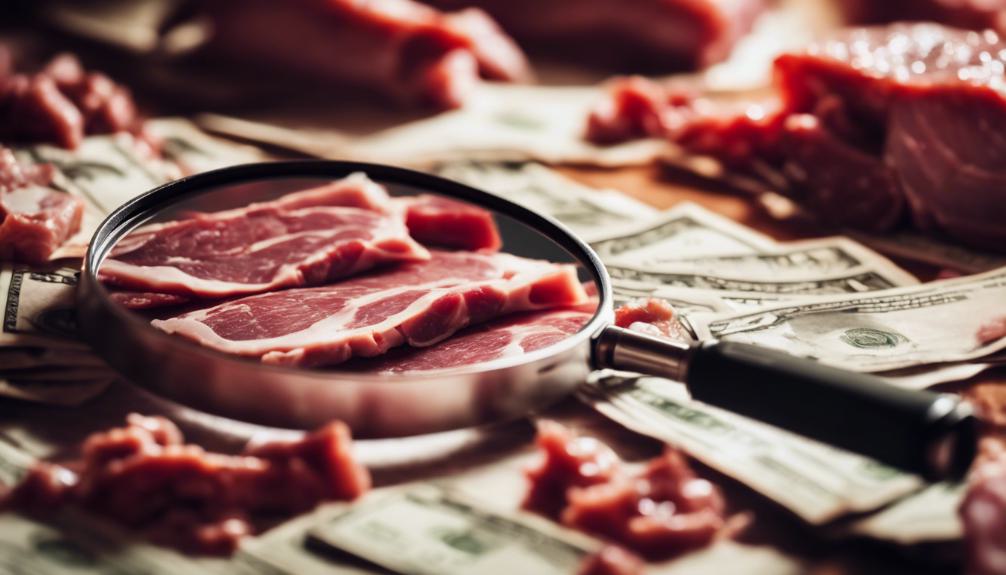Pork Price-Fixing Scandal Rocks Industry
The revelation of a pork price-fixing scandal has sent shockwaves through the agribusiness sector, leading to a high-profile class action lawsuit that implicates some of the industry's largest producers. Allegations center on the misuse of data analytics for orchestrating a manipulation of market prices, a practice that, if proven, could greatly alter our understanding of fair market operations and antitrust laws in the agribusiness domain. With settlements already being reached with key players such as JBS and Smithfield, the unfolding legal drama not only promises to redefine industry standards but also raises critical questions about the transparency and ethics of market practices. As this case progresses, the implications for both the industry and consumers loom large, leaving many to wonder about the eventual outcomes and the precedents they might set.

Key Takeaways
- Major pork producers accused of using data analytics for coordinated price-fixing between 2014-2018.
- Settlements reached with key industry players like JBS and Smithfield amidst ongoing legal battles.
- Consumers and market competition impacted by alleged scheme, prompting lawsuits and regulatory investigations.
- Industry efforts underway to rebuild consumer trust and ensure transparency in pricing practices.
Lawsuit Overview

Initiated in 2018, the class action lawsuit against major pork producers has brought to light allegations of a coordinated effort to fix pork prices, utilizing data analytics from Agri Stats to allegedly manipulate the market. This lawsuit underscores a significant concern within the agricultural sector, spotlighting the potential misuse of market data to influence pork prices unfairly. The litigation targets several key players in the pork industry, aiming to address and rectify the alleged price-fixing scheme that could have far-reaching consequences for both consumers and the market. As the legal battle continues, the outcomes of this case could set important precedents for how data analytics are used in agricultural pricing and the enforcement of fair trade practices within the industry.
Allegations Explained

Building on the overview provided, let's now examine the specific allegations at the heart of the pork price-fixing scandal. In 2018, a class-action lawsuit was filed against major pork producers, accusing them of conspiring to manipulate and inflate pork prices across certain states between 2014 and 2018. These allegations suggest a coordinated effort among these producers to limit the production of pork, thereby reducing supply to artificially raise prices. Such actions, if proven true, would violate antitrust and consumer protection laws, undermining the competitive market and financially harming consumers and businesses that rely on pork as a staple food product. The lawsuit aims to hold these producers accountable, seeking damages for those affected by the alleged price-fixing scheme.
Data Analysis Role

A critical element in the pork price-fixing scandal is the role of data analysis, specifically how Agri Stats' information was allegedly utilized to coordinate pricing strategies among major pork producers. This sophisticated use of data analytics provided these companies with detailed insights into the market, their competitors' production volumes, costs, and sales data, which, according to allegations, facilitated an environment ripe for collusion. By analyzing this exhaustive data, companies could adjust their production and pricing strategies in a way that artificially maintained higher pork prices, directly impacting consumers and the market's natural competitive balance. This manipulation of data for anti-competitive practices underscores the growing concern over how data analytics can be exploited in industries to undermine fair market principles and harm consumer interests.
Eligibility Criteria

Understanding the eligibility criteria is paramount for individuals seeking to participate in the class action lawsuit related to the pork price-fixing scandal. Central to these criteria is the purchase of specific pork products between the years 2014 and 2018. However, eligibility is not uniform across the board; it applies to purchases made in certain states, as outlined in the lawsuit details. To actively pursue a claim within this lawsuit, potential participants must complete a claim form, a critical step for those seeking to receive a settlement amount in the future. This process guarantees that only those who meet the defined purchase history and location criteria can take part in the legal action against the major pork producers implicated in the price-fixing scheme.
Legal Process Insights

Traversing the legal intricacies, the pork price-fixing lawsuit, initiated in 2018, remains entangled in the judicial system, with several key producers already reaching settlements. This complex legal battle stems from allegations that major pork producers conspired to fix the price of pork products, notably impacting consumers and the market. Utilizing data analysis from Agri Stats, these producers allegedly coordinated their actions to manipulate prices. The legal process has been lengthy, reflecting the case's complexity and the vast amount of data and testimonies involved. Opting out of the lawsuit remains an option for those seeking individual legal recourse, but it disconnects them from any collective settlement or judgment. As the case progresses, the intricacies of legal strategy and procedural maneuvers continue to unfold, underscoring the considerable challenges in adjudicating such a multifaceted dispute.
Settlement Updates

Building on the legal framework previously outlined, the recent developments in the pork price-fixing lawsuit introduce critical settlement updates that impact both the industry and claimants. Since the lawsuit's initiation in 2018, there have been significant movements towards resolution, with several major pork producers like JBS and Smithfield reaching settlements. These agreements reflect a concerted effort by the industry to address the allegations of conspiring to fix pork prices using data analysis from Agri Stats, thereby potentially restoring trust among consumers and stakeholders. For claimants, these settlements mark a pivotal moment, as they now have the opportunity to receive compensation for the overpriced pork products purchased between 2014 and 2018, contingent upon the completion and submission of valid claim forms by the specified deadlines.
Claim Submission Guide

For claimants seeking compensation from the pork price-fixing settlement, submitting a claim form correctly and within the designated timeframe is essential. The class action lawsuit, initiated in 2018, has revealed a complex scheme where major pork producers allegedly conspired to fix prices, affecting a broad range of consumers and businesses. To be considered for a share of any settlement, individuals and entities must complete the claim form with accurate information reflecting their purchases of specific pork products between 2014 and 2018. It is important to submit this form before the deadline to guarantee eligibility. The process involves gathering relevant purchase documents, meticulously filling out the form, and adhering to the instructions provided. This effort is critical for participating in the potential financial remedy provided by the settlement.
Participation Options

Individuals interested in seeking compensation from the pork price-fixing scandal must understand the various participation options available to them. Primarily, eligible participants are those who purchased specific pork products between 2014 and 2018 in certain states. To potentially receive a settlement amount, claimants must complete a claim form detailing their purchases. Therefore, participation in the class action lawsuit is voluntary. However, opting out of the lawsuit is a significant decision; it means individuals will not be bound by the lawsuit's outcome, forfeiting the chance to receive any future settlement amounts. Therefore, individuals must carefully weigh their options, considering the potential benefits of staying within the class action versus opting out, based on their circumstances and the specifics of their purchases.
Spotting Scams

While discussing the options for participation in the class action lawsuit, it is equally important to address the potential risks of scam attempts that claimants might encounter. Amidst legitimate legal proceedings, opportunistic scammers may target individuals with fraudulent offers or requests for personal information, masquerading as representatives of the class action suit. To protect oneself, it is critical to verify the source of any communication received related to the lawsuit. Authentic notices will not ask for payment or sensitive personal information such as Social Security numbers. Additionally, claimants should refer directly to the official lawsuit website or contact the appointed legal representatives for confirmation of any doubtful correspondence. Staying informed and cautious is key to avoiding scams while moving through the class action process.
Frequently Asked Questions
How Does a Pork Price-Fixing Scandal Impact Local Farmers and the Broader Agricultural Community?**
A pork price-fixing scandal can severely impact local farmers by potentially lowering market prices, reducing profit margins, and undermining trust within the agricultural community. It may also lead to increased regulatory scrutiny and legal challenges.
This Question Delves Into the Broader Implications of the Scandal Beyond the Legal and Consumer Spheres, Focusing on Its Effects on Small-Scale Farmers, the Dynamics of the Agricultural Market, and the Overall Health of the Rural Economy.
The question explores the implications on small-scale farmers, agricultural market dynamics, and the rural economy's health, stemming from practices that potentially manipulate market conditions, affecting competitiveness, pricing fairness, and the sustainability of agricultural communities.
Are There Any Long-Term Consumer Behavior Changes Expected as a Result of the Pork Price-Fixing Scandal?**
The class action lawsuit alleging pork price-fixing among major producers may lead to long-term changes in consumer behavior, including increased scrutiny of meat pricing and a potential shift towards alternative protein sources.
This Question Explores the Potential Shifts in Consumer Trust, Purchasing Habits, and Preferences for Pork Products or Alternative Proteins, Considering the Public's Reaction to the Scandal and Its Revelations.
The inquiry explores prospective alterations in consumer trust, purchasing behaviors, and inclinations towards pork or alternative proteins, following public awareness of industry malpractices. It underscores the importance of transparency and ethical conduct in influencing consumer choices.
What Measures Can the Pork Industry Take to Prevent Future Price-Fixing Schemes?**
To prevent future price-fixing schemes, the pork industry should enhance transparency in pricing mechanisms, implement rigorous compliance programs, and foster a culture of ethical business practices, while also cooperating with regulatory bodies for oversight and accountability measures.
Conclusion
In summary, the pork price-fixing lawsuit represents a pivotal moment in agribusiness, highlighting the potential for misuse of data analysis in manipulating market prices. The settlements reached with leading pork producers underscore the legal system's capacity to address antitrust violations, offering a measure of redress to affected parties. This case serves as an important reminder of the importance of market transparency and the vigilance required to protect consumer rights. Future participation in similar lawsuits necessitates awareness of potential scams, ensuring that justice is accessible and equitable for all impacted individuals.

This post has been generated by AI and was not reviewed by editors. This is Not legal advice. Please consult with an attorney.




